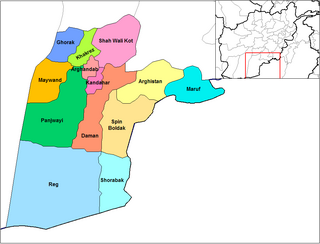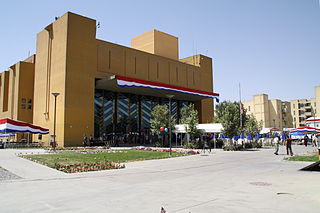During the 2001 Invasion of Afghanistan, many Taliban, al-Qaeda and militant fighters were captured and held at military bases in the region. On several occasions, there were instances of mass escapes.
Shahzada Akhund, known also by the title Mullah, was a Taliban militant commander who was held at Guantanamo Bay following the 2001 ouster of the Taliban regime in Afghanistan. He used a false name, Mohammed Yusif Yaqub, and pretended to be an innocent civilian.
Fazal Hayat, more commonly known by his pseudonym Mullah Fazlullah, was an Islamist jihadist militant who was the leader of the Tehreek-e-Nafaz-e-Shariat-e-Mohammadi, and was the leader of the Tehreek-e-Taliban Pakistan in Swat Valley. He became the emir of the Tehrik-i-Taliban Pakistan in 2013, and presided over the descent of the group into factions who are often at war with each other. Fazlullah was designated by the Al-Qaida and Taliban Sanctions Committee of the Security Council in 2015, and was added to the U.S. State Department's Rewards for Justice wanted list on 7 March 2018.
The Sarposa Prison attack was a raid on the Sarposa Prison in Kandahar, Afghanistan by Taliban insurgents on June 13, 2008. One of the largest attacks by Afghan insurgents, the raid freed 400-1,000 prisoners. As of 2008, prison administration was overseen by Abdul Qabir.
Kandahar Central Jail, also known as Sarpuza Prison, is a minimum-security prison in Kandahar, Afghanistan. It is located next to the Kandahar-Herat Highway in the Sarpuza neighborhood, which is between the neighborhoods of Mirwais Mena and Shahr-e Naw, in the western part of the city. Its current warden is Sayed Akhtar Mohammad Agha Hussaini.

The Battle of Arghandab, codenamed Operation IBRAT by the insurgents, began on June 18, 2008, when NATO-led forces attacked Taliban militants in response to Taliban attacks in Arghandab District and Kandahar in Afghanistan. The battle in Arghandab marked the second time in less than a year that the Taliban tried to take control of the area.

Zabihullah Mujahid is an Afghan spokesperson who has been the chief spokesman for the internationally unrecognized Taliban regime of Islamic Emirate of Afghanistan since 25 October 2021 and their Deputy Minister of Information and Culture since 7 September 2021. He has long served as one of several spokesmen for the Taliban, the others being Suhail Shaheen and Yousef Ahmadi. Mujahid commented mainly on the Taliban's activities in eastern, northern, and central Afghanistan, while Ahmadi focused on the western and southern regions. In addition to being the government's main spokesman, Mujahid serves as a personal spokesman for Supreme Leader Hibatullah Akhundzada.

The Pakistani Taliban, formally called the Tehreek-e-Taliban-e-Pakistan, is an umbrella organization of various Islamist armed militant groups operating along the Afghan–Pakistani border. Formed in 2007 by Baitullah Mehsud, its current leader is Noor Wali Mehsud, who has publicly pledged allegiance to the Afghan Taliban. The Pakistani Taliban share a common ideology with the Afghan Taliban and have assisted them in the 2001–2021 war, but the two groups have separate operation and command structures.
David Stephenson Rohde, a journalist for The New York Times, and two associates were kidnapped by members of the Taliban in November 2008. Rohde was in Afghanistan doing research for a book. After being held captive for eight months, in June 2009, Rohde and one of his associates escaped and made their way to safety.
The Battle of Kandahar was an attack by Taliban forces on May 7, 2011, in the city of Kandahar. The battle was the biggest Taliban offensive of 2011, marking over 40 total deaths and over 50 total wounded. The fighting demonstrated that, despite heavy losses since 2001, the Taliban forces remain a threat to coalition and Afghan forces, and show that morale in insurgent groups has not died since the killing of Osama bin Laden.
Ehsanullah Ehsan is a former spokesman of Tehreek-e-Taliban Pakistan (TTP) and later Jamaat-ul-Ahrar. As a spokesperson of the groups, Ehsan would use media campaigns, social media networks and call up local journalists to claim responsibility for terrorist attacks on behalf of the groups. He was initially a spokesman for the Tehreek-e-Taliban Pakistan (TTP). In 2014, he left TTP after he had developed ideological differences with the TTP leadership following the appointment of Fazlullah as the leader of the group. He later co-founded Jamaat-ul-Ahrar and became its spokesman. In 2015, as a spokesman of Jamaat-ul-Ahrar, he condemned Fazlullah-led Tehrik-e-Taliban attack on a school in Peshawar.

The April 2012 Afghanistan attacks took place on Sunday, 15 April 2012, at around 13:00 local time when heavily armed Taliban insurgents and suicide bombers launched multiple coordinated attacks throughout Afghanistan. Insurgents launched the 2012 spring offensive on multiple locations, including government buildings, military bases, and embassies. Attacks occurred in four Afghan provinces, including Kabul and Paktia. Different reports attribute responsibility for the attacks to either Taliban or the Haqqani network although the Taliban have claimed responsibility.

Taliban militants, wearing Afghan army uniform, stormed a prison outside the city of Ghazni in Afghanistan on 14 September 2015, freeing more than 355 inmates. At least 148 of the escapees were considered to be a serious threat to national security. According to the Afghan Ministry of Interior, of the inmates who escaped, 148 had been jailed for attacks on security forces, while 207 had been convicted for other crimes. Only three prisoners had been recaptured.
The Battle of Farah began on 14 May 2018, when Taliban fighters launched an assault on the city of Farah, located in western Afghanistan.

The Islamic State–Taliban conflict is an ongoing insurgency by the Islamic State Khorasan Province (IS-KP) against the Taliban regime in Afghanistan. The conflict initially began when both operated as rival insurgent groups in Nangarhar; since the formation of the Taliban's state in 2021, IS-KP members have enacted a campaign of terrorism targeting both civilians and assassinating Taliban members using hit-and-run tactics. The group have also caused incidents and attacks across the border in Pakistan.
Events in the year 2020 in Afghanistan.

The Battle of Kandahar began on 9 July 2021, as Taliban insurgents assaulted the city to capture it from the Afghan National Security Forces (ANSF). After heavy fighting for weeks the city's defenses had started to dissolve in August. This allowed the Taliban to enter and overrun most of the city on 12 August 2021, including the Sarposa prison, which included the release of over 1,000 prisoners, and ultimately the capture of the city. However, the siege for the nearby airport continued, where government loyalists held out until being evacuated on 16 August.

The Gilboa Prison break was a security event in Israel which occurred on 6 September 2021, when six Palestinian prisoners escaped from Gilboa Prison, a maximum security prison in northern Israel, through a tunnel.







